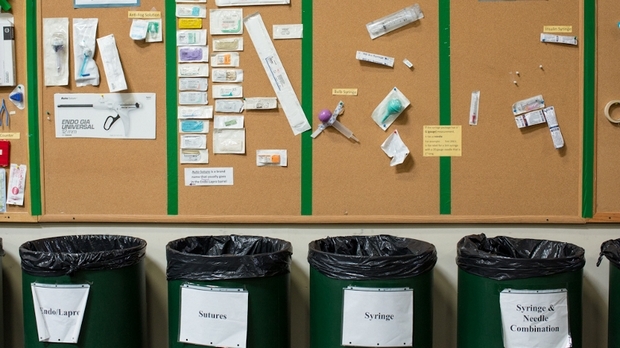Finding a home for unused medical supplies
- May 31, 2013
- By Kerri Jansen

Volunteers sort surplus medical items into barrels at a MedShare distribution center.
When a hospital completes a surgery, examination or other procedure, there are generally leftover materials — gloves, gauze, syringes — that were prepared for the procedure but never used.
Those materials are often disposed with red bag waste, but several organizations are attempting to recover these items and redistribute them to hospitals in need.
MedShare, one of the largest medical surplus redistributors, in its last fiscal year collected 550 tons of surplus medical supplies and redistributed them to hospitals in developing countries, medical mission teams and free clinics in the U.S. Founded in 1998, the non-profit organization currently operates two volunteer and distribution centers, one in San Leandro, Calif., and the other near Atlanta, Ga., that together work with more than 80 hospitals to recover surplus supplies and equipment.
Hospitals generate an estimated 2 million tons of waste per year. A study of the San Francisco Bay Area showed hospitals were the third-largest waste producers among 48 studied types of businesses, said Chuck Haupt, executive director of MedShare's western region.
MedShare works with the hospitals surrounding its distribution centers to divert more than 5,000 types of medical supplies, and also accepts working equipment that has, for example, been replaced by a newer model, along with donations from national manufacturers and distributors.
A common challenge in recovering medical surplus is that a large portion of items collected are unusable. Donated supplies may be expired, or equipment is too expensive for a hospital in a developing country to maintain. MedShare aims to minimize that challenge by educating their partner hospitals on what items can be donated.
"We work with the hospital executives to develop a diversion program that benefits the hospital, and benefits the local community, and certainly benefits the recipients that we ship aid to," Haupt said.
MedShare sets up recycling barrels in hospitals wherever a large amount of supplies are used — operating rooms, emergency rooms, etc. — and trains staff to know which items can be recycled. The contents of the bins are then collected by MedShare, which asks hospitals for a donation to cover transportation and other costs.
All supplies are weighed upon reaching a MedShare distribution center, where volunteers then sort the items and prepare them for shipment. Occasionally, hospitals will still donate items that are expired or otherwise unusable, but that is "a very small percentage," Haupt said.
To ensure materials will be properly used, MedShare requires potential recipients to submit an application for aid. In addition to hospitals in developing countries, the organization also supplies traveling medical groups and domestic clinics. The application includes a series of questions intended to verify that recipients are trained in using the items and authorized to accept charitable aid. If approved as a partner, recipients then have access to MedShare's unique online ordering system, where they can pick out exactly what they need.
"What makes us a little bit special is that what we do is establish an online database that's analogous to like Amazon.com," Haupt said. "After we establish a partnership with an overseas hospital in the developing world, they will ... go online and order exactly what they want from us. ... Most aid organizations, while they're doing good, they could do better by allowing the recipient to order what they need to treat their patients."
Top-requested items include basics like surgical and examination gloves, sterile suture and gauze. Haupt said that in hospitals without adequate supplies, he's seen surgeons working without protective gloves, or closing incisions with fishing line. There is also "a tremendous need" for items like diagnostic equipment and imaging equipment, he said.
"The things that we take for granted here in the U.S., they just don't have access to these supplies and equipment and services," Haupt said.
![]()
w w w . w a s t e r e c y c l i n g n e w s . c o m
copyright 2013 by Crain Communications Inc. All rights reserved.